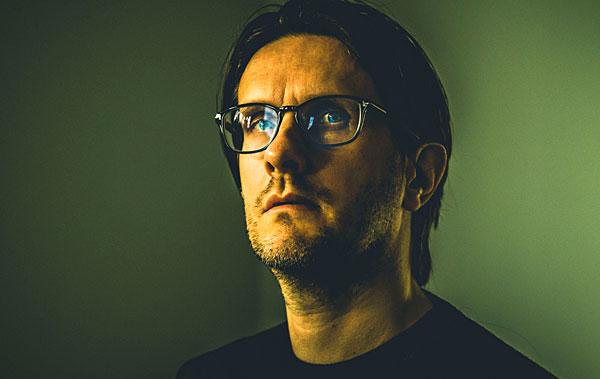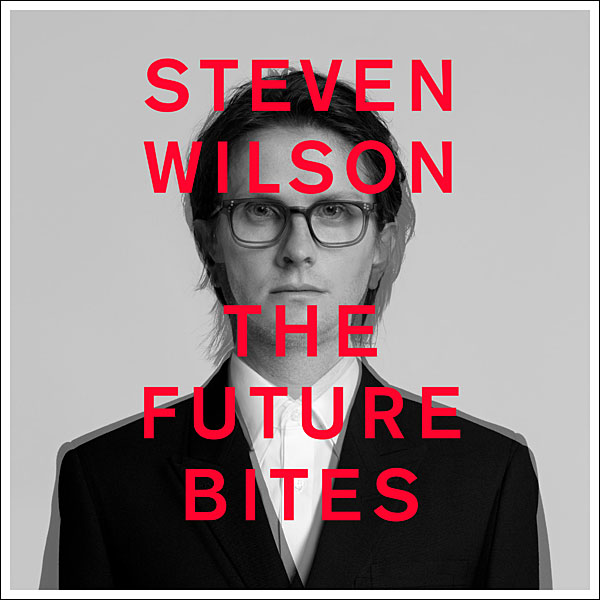I'm happily spinning along on the bike listening to the new album, when Elton/Alexa's voice came on in Personal Shopper, and I was on Amazon in a second. They obviously knew I was coming and put a steep discount on the Beatles' Abbey Road box with the Atmos mix. Steven's bluray arrives next week and then the Beatles the week after. I blame all of you, but Elton most of all.
Steven Wilson Is a Hi-Res Man of the People

And that, my friends, is Steven Wilson for you in a nutshell. The once and future king of surround sound has taken yet another giant creative leap forward with his new solo album, The Future Bites (Arts & Crafts), which, after a pandemically induced half-year deferral, is finally being released on January 29, 2021. And if its genre-bending aural contents just so happen to ruffle some of those hardline "don't ever change" expectation feathers that permeate his fanbase flock, then that's totally fine by him.
"My perspective on music is always changing anyway," Wilson points out. "What I want to do with music is always in a state of flux and evolution, and that's what keeps me excited. I don't ever want to make the same record twice. In fact, I hope I never make the same record twice."
Based on Wilson's impeccable track record, that statement appears to be a safe bet. People tend to forget one of his earliest ventures, the much-lauded Porcupine Tree, essentially began as a one-man experimental psychedelic trip before evolving into a powerhouse post-prog collective. Outside of the Tree, Wilson spread his artistic tendrils amongst a number of genre-challenging projects—Bass Communion, Blackfield, I.E.M., No-Man, and Storm Corrosion, to name but a few—and over the course of a solo career now firmly entrenched in its second decade, he stands tall an artist not intent on hanging his hat on any of his past accomplishments.
To that end, The Future Bites moves Wilson's recorded C.V. into further semi-uncharted territory only hinted at on his last solo album, August 2017's course-shifting To the Bone. On TFB (ah, now you're getting one of the many underlying meanings of that title!), songs like the '80s-centric lamentations of "12 Things I Forgot," the alt-pop consumer indictment-cum-inducement of "Personal Shopper," and the falsetto-drenched neo-prog soul drizzle of "Man of the People" all reflect the scope of the man's many musical interests. And not to worry, surround fans—the multiple layers of TFB's sonic palette can be thoroughly enjoyed on Blu-ray via Wilson's envelope-pushing 5.1 and (yes!) Dolby Atmos mixes alike.

Wilson is quite at ease when it comes to assessing where his career trajectory has taken him as an artist. "You know what? People who only listen within a very limited set of musical parameters are not the people I'm trying to appeal to, really," he admits. "If you want generic music, there's plenty of it out there. What I want to do with my life and my career is to not be affiliated with a particular genre, but to create my own musical universe." I think it's fair to say the broad-stroke contents of TFB fit that particular cosmically inclined bill to a T, F, and B all at once.
Wilson, 53, and I recently got on Zoom across the Pond to discuss the full creative arc of The Future Bites, how Sir Elton John insisted on being the vocal personification of "Personal Shopper," the status of certain upcoming surround-mix releases he's done for other artists, and what some of his personal dream Atmos mixes would be. Buy the box set and the kind of stuff you've bought before a million times. . .
Mike Mettler: First of all, if I heard the line correctly, I have to thank you for singing, "There was a time when I had sound and vision." Is that what you sang in "12 Things I Forgot," or not?
Steven Wilson: Umm, it's actually, "There was a time I had some ambition."
Mettler: Oh, ok. Clearly, I got it wrong. Can you blame me? (laughs)
Wilson: But I like the idea. You misheard it in reference to your own magazine. That's alright, yeah. (grins)
Mettler: And what does that say about me? Don't answer that. (chuckles)
Wilson: But it is interesting, isn't it? Because, in a way, The Future Bites album is partly this idea that we all see the world through our own kind of little self-absorbed prison. I'm not suggesting that you do that, Mike, but, yeah—interesting.
Mettler: Maybe I do! (chuckles) Well, I do have to say I think you've totally tapped into your inner Neil Young on The Future Bites. And I have a feeling a lot of certain hardcore fans are going to have an interesting time wrapping their heads around it—but I love everything about it. I think you opened the door with "Permanating" [a polarizing track on his previous album, the aforementioned August 2017 release, To the Bone] to just let people know, "I have to do what I want to do as an artist." Is this the most "free" you've felt as a creator on a record? The Future Bites really does seems like it's saying, "I'm doing my own thing here, 100 percent."
Wilson: I'm not sure I've ever felt any different about anything I've done in that sense, but there was definitely a sense of trying to drive home the point of creating my own musical universe, like I said before.
You mentioned Neil Young there. Of course, he's an example of the kind of artists who create their own musical world within which they apparently are able to do almost anything musically, and still have the respect of their fanbase. It's a fairly short list—you know, let's be honest—because it's a very hard-earned thing. And I would argue it's harder to do now than at any time in history, because we have the immediate fear of negativity that greets almost everything an artist does. It almost doesn't matter whether whatever you do is amazing—there will be a kickback and negativity, in a way.
In the past, artists like Neil Young, David Bowie, and Frank Zappa were all people who would fall into this category that garnered them a wave of negativity, and I had to cope with that myself. And you know me, Mike—I'm very bloody-minded, and very willful. (both chuckle heartily)
Mettler: (sarcastically) Yeah, I never got that from you. Gee, I never thought about you like that. Not at all.
Wilson: (laughs) I feel like I've been doing it my whole career to an extent. Particularly with this album, I'm putting the guitar down and embracing electronic sound a lot more, which I know is kind of a red rag to a lot of my older fans—and I understand that. [MM notes: "red rag" is British slang for something that can infuriate people.] But most of them, actually, when they allow themselves to engage with this record, I think they're going to really like it.
Mettler: Yeah. It's one of those "growers," as the saying goes. I feel like in some ways, you also tap into that inner-'80s child of yours we've talked about before—which I think is fantastic, honestly. Do you feel that was some of the stuff you were trying to tap into for inspiration?
Wilson: Well, that's a really interesting point, because to me, one of the things about this record I was very adamant about was I wasn't going to deliberately or knowingly homage anything. The reason I say that is because, if I have an Achilles heel, it is that I am so familiar with the history of music. I'm a student of the history of music, as I know you are—and when I come to making my music, sometimes I do fall into that rabbit hole of homage, or pastiche. I know I do. I know I do! I know I've done that.
One of the reasons I wanted to work with David Kosten, who co-produced the record with me, is to stop me from doing that. [MM notes: Also known as Faultline, Kosten has produced albums by Bats for Lashes and Everything Everything, and he's collaborated with the likes of Coldplay, Michael Stipe, and The Flaming Lips.] Every time we hit on something that might sound like a Beatles track, a Kraftwerk track, or a Bowie track, I would be like, "Oh, amazing! It sounds like Bowie!"—but David would be like (snaps fingers), "Yeah, we can't do that. It sounds like Bowie!" (laughs)

And that was really refreshing to me, because I'm usually the person who gets very excited about things when something reminds me of something I love. I think David was really key in just stopping me from tipping over into that world of homage. I know I can't totally hide my musical DNA—but it's impossible not to make any music now without doing that.
Mettler: I hear that, and I think it's ok. We're allowed to feel these musical touchstones, but your name kind of defines who you are. When you say the words "Steven Wilson," that's a concept, and it's something that should give people the thought of, "I'm going to hear something interesting, different, unexpected, and adventurous"—and that's not a bad place to be, honestly.
Wilson: No. And I think, as you touched on there, the most important thing is whatever you do, you filter it through your own personality and originality. To be honest, that's what everyone has always done. I mean, The Beatles did it. Led Zeppelin did it and The Rolling Stones did it, whether it was filtering Chicago bluesmen or American rock & roll records. The point is, they all did it, but their personalities are so strong that it ends up just sounding like Led Zeppelin, The Beatles, and The Rolling Stones. I like to think that's ultimately what I'm doing too.
Mettler: Well, I'd have to agree with that. I also happen to like certain other things you embraced on this record, like the falsetto singing you do on songs like "Man of the People." Was that your initial thought to sing it that way in the studio, or did it evolve as you kept working on it?
Wilson: You know, I really like singing falsetto. I've done it before, but yeah, I think you're right. It definitely ramps up on this record, for sure. And that's my little Marvin Gaye moment on "Man of the People," where I imagine I'm being Marvin Gaye in my wildest fantastic dreams. (MM chuckles)
There is also someelectronic manipulation on the album—like, for example, on a track like "King Ghost," with some of the real high parts. Also, there's a part where I make my voice sound really deep and low, and that is using electronic manipulation, actually.
Mettler: Of course, you know how much I love hearing any of your music in high resolution, especially when it comes to your surround mixes on Blu-ray. The Future Bites is tailor-made for that kind of detailed listening.
Wilson: This record sounds so good sonically, and I'm particularly proud of the way the Dolby Atmos mix came out. Mettler: It really is fantastic. Tell me how you got into Atmos, how your Atmos experience went, and what you like about it—all of it.
Wilson: I first heard Atmos just over a year ago when I went to hear [The Beatles' benchmark September 1969 album] Abbey Road at Abbey Road [Studios in London] in Atmos—and really loved it. For me, it's the elevated speakers that make a difference. It's being able to not only move the sound around in the horizontal plane, but also how to move into the vertical plane. It's so exciting to me, as somebody who already loves immersive audio and surround sound audio. And now my home studio is an Atmos studio.
It was really being able to use that extra height to create something completely enveloping that got to me. I got very excited about it, and I've done a few things in Atmos since. I think The Future Bites is going to be, well, it may not be completely the first new album released on physical media in Atmos, but it must be one of the first.
Mettler: I think you're right about that! What were your goals for the Atmos mix of The Future Bites?
Wilson: Oh, wow. It's been a while since we did the Atmos mix, which was about a year ago now. I mean, listen—we had fun with it. For example, I've always had a fairly consistent idea about how I mix things in 5.1. I wouldn't say I'm conservative, but I'm not into this idea of having things whizzing around the room. But when I came to do the Atmos mix, I was like, "You know what? We've got the 5.1 mix. Let's just go a bit silly with the Atmos mix." (laughs)
Mettler: Good. I like that. (laughs)
Wilson: There is a lot of stuff bouncing. Well, not a lot of stuff, but there is stuff bouncing around the room in the Atmos mixes for sure.
Mettler: "Personal Shopper" is an interesting example. By the time we get to the Elton John spoken-word section, he's pretty much all around you, going wherever each different phrase he says takes you, in a different space.
Wilson: Pretty much, yeah. The whole thing about that particular section is you've got the two elements. You've got the main voice speaking of things like the shopping items, and then you've got the inner voice where Elton's saying things like "self-obsession" and "self-indulgence." It was just his inner psyche, you know? You can imagine we had a lot of fun with that in Atmos, yeah.
- Log in or register to post comments



...On a great in-depth interview. It's always good to get an update on Steven's outlook on his music and new projects. Now I also have to hunt down Tull's A - I don't remember ever hearing it, or if I did, it's so far in the past that I need to give it another go.

Steven is surround God and I just wish an even longer, more detailed interview about his Atmos mixing, the gear he's using for Atmos mixes, etc...Picture of his Atmos studio would be also nice. Also, it would be fun to have his own albums in Atmos, but if I'm honest, his albums in "only" 5.1 sounds way better than 95% of other Atmos music mixes (on Tidal...). They're just bloody perfect! Now I need to go buy the Future Bites on Blu-Ray , because the album is available "only" in DD+/Atmos on Tidal and album like this deserves full blown TrueHD Atmos of course :)

Atmos is a metadata it doesn't care how it was delivered, the resulting mix is the same. The issue that Tidal and Dolby "created" is that they encode it too soft, namely the dialnorm offset is to low at an average -13db which forces the listener to turn up the MV way higher than normal to achieve the same loudness one normally listens to with other media. However this doesn't create any real technical problems and certainly won't affect the mix itself. I listened TFB on Tidal in Atmos and it was very good mix wise, on par with his other stuff. My BD copy should be here soon too, so I can make my own comparison but unlike you I won't expect any major differences other then @10db on the MV dial.

Yes this album is a major turn and not for the better. It doesn't mean that changes are bad, he's been doing lots of different stuff over the years, and some where good some were not so good. To me the real silly stuff was the "neo disco" vocals and rhythms. While as an album or concept works ok but as each track on their own have very little to offer musically. I'm surprised this didn't come up in the interview but apparently Wilson thinks Guitar centric Rock music is dying like Jazz was after Rock came about, and Urban type music or any as such with heavy electronics will replace it. I think it's already happening to some extent, and that's why I was surprised he went to that direction in his 50's. Maybe he's more Bowie than he realizes.

























































